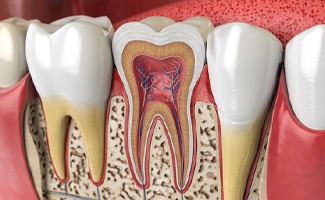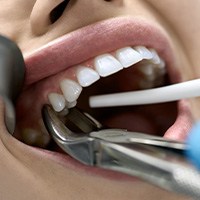When you bite down, do you feel pain? When you brush or floss, do your gums bleed? Are you experiencing a different abnormal dental symptom, like persistent dental sensitivity? If so, don’t take the “wait and see” approach. Instead, call our Reno dental team to schedule an emergency exam. Once we take a look at your X-rays and examine your teeth and gums, we can determine if root canal treatment is needed. If it is, don’t worry – we’ll go the extra mile to ensure the procedure is completely painless.

One of the easiest ways to tell that something is wrong is by assessing your symptoms. Here are a few that are often the result of significant dental damage:
Of course, our talented dentists near Reno will also check for tooth decay, infection, and the like during your routine checkups. If they detect anything, they will bring it to your attention, review your restorative treatment options, and answer any questions you have.

It’s important that we mention here that the very first step of the entire root canal treatment process is thoroughly numbing your mouth. That way, you don’t feel any pain or discomfort during your time in the treatment chair. Once you’re completely numb and ready to begin, we will access the inner chambers of your tooth with special instruments so we can remove the pulp. Next, we will sanitize the area and fill your tooth with a synthetic gutta-percha material. Lastly, we will cement a custom dental crown in place to restore the strength of your bite and protect your treated tooth from chips, cracks, and fractures.
Note: Since we use CEREC® one-visit dental crowns, you don’t have to worry about temporary crowns, multiple visits, and the like – the entire process is completed in a single appointment!

Since many patients are scared that root canal treatment will hurt, we’ll first mention that the procedure is painless thanks to powerful numbing agents and the latest dental techniques. This restorative service also can save your tooth from needing to be extracted, which benefits your oral health as well as your wallet. Finally, the procedure has a high success rate, and no unwanted attention will be drawn to your smile since the restorations used are extremely lifelike!
Still have questions about root canal treatment? Don’t hesitate to reach out to us so we can provide you with the answers you’re looking for!

Many patients are skeptical of root canals, but they’re often necessary to save a severely damaged or infected tooth. So, while it may seem like a costly procedure, it’s actually a long-term investment in your oral health. At Sage Dental Care, we strive to provide high-quality work and ensure that your treatment is both effective and affordable. If you’re suffering from tooth pain, read more below to see what affects the cost of root canals and how we can help you get the care you need.

Unfortunately, we can’t quote a specific price for the cost of your treatment. This is because there are several factors that can cause the cost of root canal treatment to fluctuate, including:

At face value, yes. Extracting a tooth is often cheaper than treating it with a root canal. However, it’s important to consider the hidden tolls associated with extraction. For example, once your tooth is extracted, it will need to be replaced with a bridge or dental implant. If you choose to forgo replacement, the jawbone where the tooth was removed will slowly deteriorate, leading to the possibility of other issues.
A root canal saves your natural tooth, preserving your bite and jawbone structure, which makes it a more cost-effective solution in the long run. Keeping your natural teeth is almost always a better idea than removing them because of the positive effect it can have on your oral health overall.

In most cases, dental insurance will cover a significant portion of root canal treatment since it’s often considered a medically necessary procedure. Coverage typically falls under major dental work, meaning that your insurance could cover around 50% of the cost. However, coverage can vary based on your specific insurance plan. If you're unsure, our team will work closely with you to maximize your benefits and help you understand what your policy covers before your procedure.

At Sage Dental Care, we understand that dental procedures can be costly, and not everyone has access to dental insurance. Root canals are necessary treatments that can restore oral function and health, so we want every patient to be able to afford them.
For those without insurance or who face high out-of-pocket costs, we proudly offer financing through CareCredit. This service allows you to pay for your treatment up-front and break down the cost into manageable monthly payments. This makes it much easier to fit treatment into your budget without delay.
Tooth pain can be very disruptive and uncomfortable, so you shouldn’t have to suffer through it. Reach out to our team today to schedule a consultation and get started on the path to a healthy, pain-free smile.
Everyone’s situation is unique, but most patients can resume life as usual the day after their procedure. However, if your job requires heavy lifting or physical labor, you may want to take a few days off to mend. You’ll need to avoid anything that elevates your heart rate or blood pressure because it can hinder healing.
You may be sore for a few days, so to avoid exacerbating your tender teeth, stick with soft foods until you’re no longer achy. Also, try to chew on the side of your mouth opposite the injured tooth. You can plan to brush and floss twice daily as usual, but you may want to be extra careful around the treated tooth.
Any associated discomfort should dissipate within a few days. If your pain worsens or persists, contact us right away so we can ensure you’re recovering as intended.
In many instances, root canal therapy relieves more discomfort than it causes. The procedure itself typically doesn’t hurt because our team will numb the area with a topical anesthetic. We may also provide sedation if you’re overly anxious or have a hard time sitting still.
It’s normal to experience some mild sensitivity or aching once the medication wears off after your appointment. Thankfully, this is usually a temporary sensation that can be effectively addressed with over-the-counter medications like Tylenol or ibuprofen.
Steer clear of overly hard or crunchy foods that could trigger additional throbbing. If it doesn’t subside after 3 days, please let us know!
Patients who have a damaged tooth that requires a root canal often arrive at our office because of the associated toothache. It’s often assumed that if you’re not hurting, you don’t have any dental problems. Unfortunately, that’s not always the case. The sensitive nerves inside your teeth can be so wounded by decay and infection that they “die” and can no longer register any sensation.
You might not even realize there’s an issue, which is why routine checkups are so important. Our team can detect problem areas that you aren’t aware of and treat them before they can progress into anything worse. If you wait to schedule an appointment, your tooth could degrade past the point of being saved and may require extraction instead.
The best and easiest way to avoid potential future root canals is to practice proper preventative care. You should brush and floss your teeth twice daily (morning and night) to remove harmful plaque and bacteria buildup that cause cavities and gum disease. It also helps to eat a wholesome diet full of nutrients that support a healthy mouth. For example, dairy contains calcium for strong teeth and bones, and citrus fruits have lots of vitamin C for your gums.
You should also schedule a routine checkup and professional cleaning with our team once every 6 months. This allows us to monitor your dental condition so that if any problems arise, we can catch them early. That way, you’re less susceptible to injuries and diseases that require a root canal.
Getting a good night’s rest the night before is a great first step, but it isn’t the only one we recommend taking. We also encourage patients not to drink alcohol or smoke in the weeks leading up to their procedure. It’s also a good idea to purchase everything you need for the recovery period beforehand, like cold compresses, soft foods, and OTC pain medication. The morning of, eat a healthy, well-balanced meal (unless instructed otherwise) and choose something comfortable to wear.
No, root canals do not make you sick. The myth that they do stems from poorly designed research conducted back in the 1920s. At the time, Dr. Weston Price claimed that it was better to remove the tooth since root canal treatment didn’t remove all of the bacteria. His findings have been debunked for several decades now, and there isn’t any scientific evidence to support the claim. So, don’t let the fear of getting ill stop you from getting the dental care you need.
Patients are usually encouraged to eat a healthy breakfast the morning of their root canal. However, there are some exceptions. For example, if you are being sedated, you may be advised to fast so the medicine doesn’t make you feel nauseous.
Although antibiotics are sometimes used in tandem with root canal treatment, they are not a suitable replacement. That’s because the medicine travels through your bloodstream, which doesn’t reach the pulp of your tooth. So, the only way to eliminate the infection is to get the dental care you need.
Simply put, the longer you wait, the more time the infection has to progress. Eventually, the nerve will die, and your surrounding teeth and gums will be compromised as well. In extreme cases, taking the “wait and see” approach can damage the tooth to the point where it can no longer be saved while also allowing the infection to spread throughout your body, resulting in systemic illness. So, for the sake of both your oral and overall health, it’s important that you get the restorative care you need when we first recommend it.
Since root canals have a high success rate, it’s rare that they need to be redone. Usually, this is necessary when the tooth in question has more canals than expected or saliva contaminated the tooth during the procedure. If you start to experience abnormal dental symptoms in the months or years following the procedure, like bleeding gums or pain when biting down, then schedule an exam with Dr. Branco or Dr. Kim ASAP.